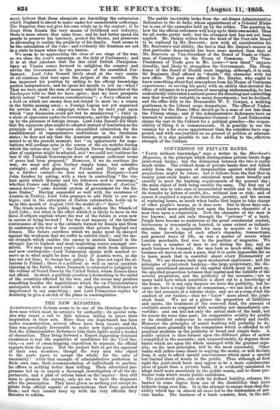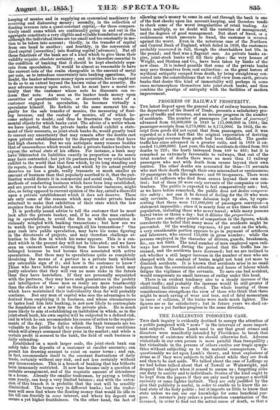CONVERSION OF PRIVATE BANKS.
"Farm without knowledge," says a writer in the Merchant's Magazine, is the principle which distinguishes private banks from joint-stook banks ; but the distinction between the two is really much wider. The evident doom of private banks does not follow solely from the exposure of irregularities against which direct precautions might be taken ; but it follows from the fact that in reality joint-stook banks are calculated much more broadly and exactly to meet the banking requirements of the present day; the main object of both being exactly the same. The first use of the bank was to take care of accumulated wealth and to facilitate its transfer by letters of credit, &c., without loss or risk; and of course it required a repute for discretion, probity, and the means of replacing losses, as much when batiks first began to take charge of other people's means, as it does now. But in those days con- fidence could more perfectly rest upon the known character of a man than upon a corporation. Now the character of the man is less known; and not only through the " privacy " of a bank. People have become so numerous at the great commercial eentresr, intercourse is necessarily so hurried, to some extent so indiscri- minate, that it is impossible for men to acquire or to keep the same knowledge of each other's character, transactions, and general ways of life, as was a matter of course when London merchants first rose to the position of magnates. We have such a number of men to see during the day, and so much business to transact; the men look so much alike, and the business all moves at such a pace, that it is quite impossible for us to learn much that is essential about every Hammersley or Paul. We are thrown back upon mechanical appliances ; and the principles of joint-stock banking—the large proprietary, the dis- tinctly ascertained amount of the capital which must be paid-up, the specified proportion between that capital and the liability of the several proprietors, and the publicity of the accounts,—are so many hard facts which constitute a short cut to a knowledge of the house. It is not only because we have the publicity, but be- cause we have a ready form of comparison,—we can look at a few of the last accounts in a tabular shape, and see at a coup-okeil the conduct of our banker,—that we "know" more about the joint- stock bank. We see at a glance the proportion of liabilities and assets, the treatment of the reserved fund, the amount of available assets as compared with securities not immediately con- vertible; and can tell not only the actual state of the bank, but its course for some time past; its comparative avidity for profits or its steadfast endeavour to consolidate its safety and credit. Moreover the principles of sound banking will probably be de- veloped more generally by the comparison which is afforded to all practical students in the publicity of broad and simple facts. A public opinion is thus formed upon the different plans of action exemplified in the accounts ; and, unquestionably, by degrees those banks which are upon the whole managed with the greatest capa- city, on the best principles, will be the most successful. Other banks will either come closer in copying the model, or will deviate from it only to afford special conveniences which meet a special but limited class of wants in the public. Thus although at first sight the joint-stock bank may appear to be a more cumbersome piece of goods than a private bank, it is evidently calculated to adapt itself more accurately to the public wants, and to those par- ticular tests which create public confidence. The joint-stock plan, also with its defined liability, releases the banker in some degree from one of the disabilities that have hitherto hung ever him. It is the attempt to escape from that dis- ability which has in almost all cases led to the destruction of pri- vate banks. The business of a bank consists, first, in the safe keeping of monies and in supplying an economical machinery for receiving and disbursing money ; secondly, in the collection of floating revenue into a quasi-constant capital,—for those compara- tively small sums which are continually going in and out in the aggregate constitute a very eligible and reliable foundation of credit, although the individual items are too small and too constantly in mo- tion to be taken into account; thirdly, in the transfer of capital from one hand to another; and fourthly, in the conversion of fixed capital [securities] into floating capital [advances]. But all these functions of the bank are of a kind which to give them their validity require absolute certainty; and it is therefore essential to the condition of banking that it should be kept absolutely sepa- rate from speculation. It would be almost as reasonable to have the current coin of the realm changeable in the amount of metal per coin, as to introduce uncertainty into banking operations. No doubt, the banker advances-money upon securities, but he ought not to do so to an extent beyond the known value of the security,. He may advance money upon notes, but he must have a moral cer- tainty that the customer whose note he discounts can re- deem that note. As soon as the banker lends money upon securities of questionable value, or discounts the notes of a customer engaged in speculation, he becomes virtually a speculator himself. He forfeits at the same moment his ca- pacity for the safe transfer of monies, the measuring of float- ing revenue, and the custody of monies, all of which be- come subject to doubt ; and thus he frustrates the very funda- mental objects for which banks exist. The advice of a writer whom we have quoted, that the private banks should exhibit a state- ment of their accounts, as joint-stock banks do would greatly tend to correct any _uncertainty that may remain do, the doubts cast upon private establishments by the disruption of some that have had high character. But we can anticipate many reasons besides- that of unsoundness which would make a private banker hesitate to expose the actual state of his affairs. For instance, a bank may have contracted its liabilities exactly in proportion as its assets may have contracted; but yet its partners may be very reluctant to exhibit to the world that that firm which, by its long standing and its repute, is classed the highest, and which by its actual probity deserves no less a grade, really transacts so much smaller an- amount of business than that popularly ascribed to it, that the pub- lication would disrate it in commercial and social rank. Particular- methods of conducting business which have been long established, and are proved to be successful in the particular instances, might also, as being opposed to current opinion of the day, entail a discredit upon a private establishment which it does not deserve. These are only some of the reasons which may render private banks reluctant to make that exhibition of their state which the law requires from the joint-stock bank. It is perfectly sound advice to tell the customer that he must look after the private banker, and, if he sees the man embark- ing in speculation, to avoid the firm in which speculation is viciously mingled with banking transactions ; but how are we to watch the private banker through all his transactions ? One may rush into public speculation, may have his name figuring in the directorate of projects' and may therefore challenge at- tention to the firm in which his name appears. This is a con- duct which in the present day will not be tolerated; and we have seen an eminent banker retiring from the house to which he belonged because he had become thus associated with active speculation. But there may be speculations quite as completely involving the means of a partner in a private bank without any ostensible sign of it ; and how is the customer to know ? Those who have hitherto kept accounts at a private bank may justly calculate that they will run no more risks in the future than they, have heretofore. If they are personally acquainted with the partners, they may have such guarantees in the probity and intelligence of those men as really are more trustworthy I than the checks at law ; and on these grounds the private banks- which have maintained their individuality thus far will probably continue. But any man of capital who sees the advantages to be derived from employing it in business, and whose circumstances or tastes lead him into banking, is not now likely to contemplate the foundation of a new firm on the private plan. He is much more likely to aim at establishing an institution in which, as in the joint-stock bank, his own capital will be subjected to a defined risk, and in which he can accommodate his course of action to the require- ments of the day. The duties which the bank transacts are too valuable to the public to fall to a discount. They need conditions which will always command their price in the market; and while a certain profit is secured to the bank, the field of such business is daily extending.
Established on a much larger scale, the joint-stock bank can safely take the deposits of a customer at smaller amounts; can permit his drawing account to exist on easier terms ; and can, in fact, accommodate itself to the constant fluctuations of daily trade, certainly without any risk, and not less certainly svithout any inconvenience. This is a branch of banking that has hitherto been immensely restricted. It now has become only a question of Imitable arrangement, and of the requisite amount of attendance in a house. Already the smaller tradesman, by paying a trifling sum yearly, can keep a very limited balance ; and with the exten- sion of this branch it is probable that the cost will be sensibly diminished. The terms vary in different banks ; but the trades- man will soon find where the floating money that would lie idle in his till can fructify in some interest, and where his deposit can secure a yet higher fruitfulness. On the other hand, the fact of
allowing one's money to come in and out through the bank is one of the beet checks upon lax account-keeping, and therefore tendli- to check some of the worst irregularities of retail trading. As- banks multiply, so no doubt will the varieties of management, and the degrees of good management. But short of fraud, or a recklessness which amounts to fraud, the customer is secured against the worst. Even in the notorious ease of the Northern and Central Bank of England, which failed in 1836, the customers probably recovered in full, though the shareholders lost 10s. in the pound; and that was a flagrant case. As private banks ex- pire, joint-stock banks will fill their place : the very houses of Wright, and &ashen and Co., have been taken by banks of the new class. It is indeed possible that some of the private banks may save themselves from real extinction : as the great heroes of mythical antiquity escaped from death, by being straightway con- verted into the constellations that we still view from earth, private banks that desire this kind of immortality will perhaps in some cases metamorphose themselves into jointstook banks, and thus combine the prestige of antiquity with the facilities of modern. improvement.



























 Previous page
Previous page